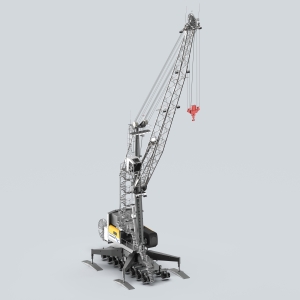


(Posted on 15/06/25)
Saga Fjordbase’s investment in the Liebherr LHM 280 mobile harbour crane underscores its commitment to future-ready port infrastructure. Ordered in April, and with delivery expected during the first quarter of 2026, the crane is tailored for electric operation and includes a rotator for versatile cargo handling. With a weather-protected staircase to the tower cabin and a reactive power compensation unit, the crane is engineered for both operator comfort and grid efficiency.
The delivery supports operations across a logistics network spanning over 1,060,000 squaremetres – enabling seamless integration into the port’s existing crane, truck, and storage systems.
The LHM 280 reflects a growing trend among ports to align equipment choices with long-term operational needs. The crane’s electric drive system, coupled with an 84-tonne winch and 48-metre outreach, significantly reduces local emissions, aligning with the port’s environmental goals.
A standout feature is the integrated reactive power compensation unit, which optimises energy use and minimises strain on the local grid. It works by adding or absorbing reactive power to balance the electricity in a system, which helps keep voltage stable and reduces the extra power the grid has to supply; this makes energy use more efficient and lowers strain on the local grid by improving power quality and reducing energy losses.
Additionally, the crane includes a weather-protected staircase to the tower cabin, enhancing safety and accessibility for operators in all conditions. Saga Fjordbase worked closely with Liebherr to configure a crane that fits the specific demands of offshore logistics in western Norway. Each element was selected with a clear purpose: to support reliable, low-emission operations in a high-throughput setting.
As Norway’s largest offshore supply base, Saga Fjordbase plays a critical role in supporting energy infrastructure and maritime logistics. The company has been investing in digital platforms such as Saga Connect and electrified port equipment to reduce its carbon footprint.
‘The LHM 280 is a strategic addition to our port’, said Dag Eikeland, VP Logistics, Saga Fjordbase. ‘Its electric drive and energy optimisation features directly support our efforts to reduce emissions and improve quay turnaround times. These are key factors in maintaining our position as a leading offshore logistics hub’.
The LHM 280 will be deployed to handle supply chain operations for offshore platforms, where reliability and turnaround time are paramount. The crane’s rotator adds flexibility for complex lifting tasks, while its electric configuration supports the port’s broader electrification efforts. The base has also reduced average quay turnaround time by 30% through the use of custom logistics software – an efficiency gain that complements the crane’s rapid handling capabilities.
The collaboration between the two companies builds on a shared vision of innovation and sustainability. The crane is part of a broader initiative to modernise port infrastructure in Florø, ensuring long-term resilience and competitiveness in the maritime logistics sector.
Leading vessel performance platform Smart Ship Hub says the industry should expect a breakthrough year... Read more
The Nordic countries are taking an important step towards decarbonising maritime transport with the... Read more
Germany’s Steelpaint has appointed ADD Marine as its representative for Greece and Cyprus, strengthening... Read more
Rio Tinto’s first Pilbara-made iron ore rail car has rolled off the production line in Karratha... Read more
Precision meets progress at Phu My Port, Vietnam. The LPS 550 has been deployed to handle bulk commodities... Read more
bound4blue, a global leader in wind propulsion systems, has expanded its industrial footprint in Asia... Read more
As the industry explores multiple decarbonisation pathways, methanol is gaining attention as a practical... Read more
Technology group Wärtsilä will supply an integrated hybrid propulsion system for a bulk carrier... Read more
Superior Industries, Inc., a US-based manufacturer and global supplier of bulk material processing and... Read more
ESL Shipping has taken a significant step forward in digitalisation by deploying a new multichannel... Read more